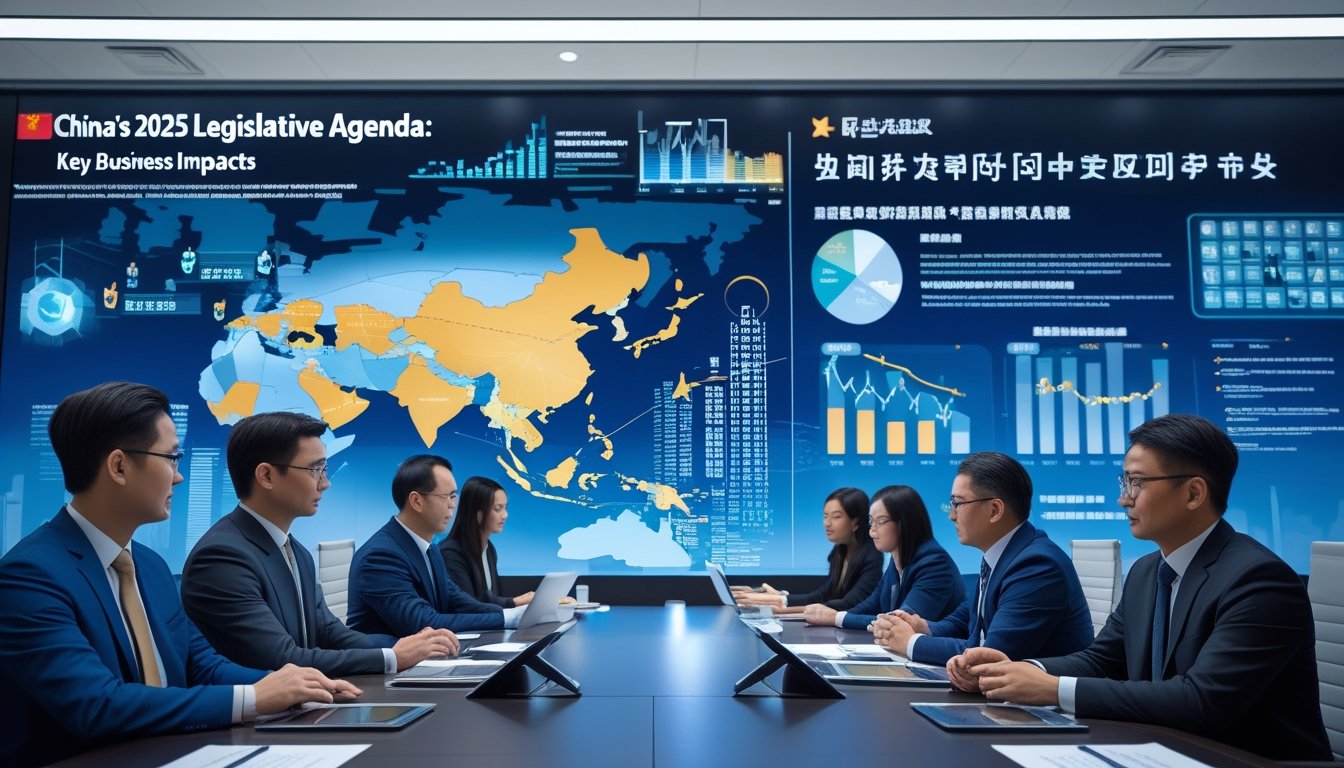China is working hard to stop businesses from playing dirty to get ahead. Their main tool to do this is the Anti-Unfair Competition Law (AUCL). Recently, the government said it wants to make this law even stronger.
Over the past 30 years, China has looked into over 750,000 cases where companies might have been unfair, and they've handed out big fines. This shows they're serious about making sure everyone has a fair chance in the market.
Now, with the tech world growing fast, China is laying down new rules to make sure tech companies are fair too.
Want to know more about how China is getting tougher on unfair competition and what it means for businesses? Read on to find out.
Overview of Anti-Unfair Competition Law
China's Anti-Unfair Competition Law (AUCL) aims to maintain fair market competition and protect lawful businesses from unfair practices. The law covers various unfair competition behaviors, ensuring a balanced and competitive market environment.
The Anti-Unfair Competition Law of China was first enacted in 1993 and has undergone multiple revisions, most recently in 2019. This law is enforced by the State Administration for Market Regulation (SAMR).
Key areas regulated include:
- Market Disruption: This includes practices like false advertising, misrepresentation, and misappropriation of trade secrets.
- Public Scrutiny: The state encourages the public to report any unfair practices.
- Employee Conduct: State organs and their employees must not support or protect unfair competition practices.
These measures ensure that business operators compete fairly, protecting both the market and consumers.
Examining Unfair Business Practices

Unfair competition in China's business environment involves issues like commercial bribery, protection of trade secrets, and tactics that cause market confusion. This section provides an in-depth look into these practices.
Commercial Bribery Analysis
Commercial bribery involves business operators giving advantages to influence behaviors or decisions unethically. In China, this is a significant concern because it distorts fair competition.
Key factors include following:
- Illegal incentives: Money, gifts, or services given to sway negotiations or decisions.
- Market impact: Reduces trust in market operations, affecting genuine competition.
- Legal actions: The Anti-Unfair Competition Law (AUCL) addresses bribery, imposing penalties and sanctions on violators.
Trade Secret Protection
Trade secrets include formulas, practices, processes, or information used to gain a competitive edge. In China, safeguarding these secrets is essential for protecting businesses from unfair competition.
Key points related to trade secret protection are:
- Legal framework: AUCL and other specialized laws protect trade secrets.
- Infringement issues: Unlawful acquisition, disclosure, or use of trade secrets can harm businesses.
- Enforcement: Legal actions can be taken against theft or misappropriation, including fines and injunctions against infringers.
Actions Against Confusion Tactics
Confusion tactics involve using similar trademarks, commercial marks, or packaging to mislead consumers. This creates unfair competition by exploiting established brands.
Key points related to confusion tactics include:
- Trademark issues: Unauthorized use of similar brands or logos to resemble established ones.
- Market disruption: Confusing tactics can divert customers and reduce brand loyalty.
- Legal measures: AUCL and trademark laws combat these actions by penalizing businesses that engage in misleading practices, requiring clear distinctions in branding.
Corporate Accountability in Bribery Incidents

In bribery incidents, companies are held accountable for their actions and those of their employees. This accountability extends to interactions with transaction counterparties.
Liability for Employees' Acts
Companies must ensure that their employees follow anti-bribery laws. When employees engage in bribery, the company can face legal consequences and damage to its reputation.
This means that businesses need strong policies, regular training, and stringent enforcement.
If an employee bribes someone, your company may be liable. Regulatory bodies like the PRC enforce these rules strictly.
It's essential to have a compliance program in place. This program should include clear guidelines, regular audits, and severe penalties for violations.
Accountability is critical; it shows that your company takes ethical conduct seriously.
Associations with Transaction Counterparties
Your company’s relationships with transaction counterparties must be transparent and above board. In China, the PRC Anti-Unfair Competition Law considers corporate-to-corporate incentives as potential bribery unless clearly defined otherwise.
Ensure all agreements with counterparties are recorded in detail.
Conduct due diligence on business partners to avoid any risk of bribery.
Insist on good faith and ethical behavior from all parties involved.
If a counterparty engages in bribery, your company might also be liable unless it can prove it took steps to prevent such actions.
Enforce strict supervision over these relationships.
Regularly review and update agreements, and maintain open communication with law enforcement agencies as necessary.
Regulatory Enhancements and Digital Economy

China has been actively improving its regulatory measures to keep pace with the rapid growth of its digital economy. These enhancements aim to address unfair competition and promote a fair market environment.
Embracing Technology in Law Enforcement
China integrates advanced technologies in law enforcement to regulate digital platforms effectively.
The State Administration for Market Regulation (SAMR) has leveraged big data and artificial intelligence to monitor and analyze market behaviors.
This technology-driven approach helps authorities identify and address violations quickly.
For example, algorithms can detect price manipulation or anti-competitive practices on e-commerce platforms.
Another key initiative involves enhancing platform rules and technical management measures to ensure compliance.
Strict oversight mechanisms are in place, making it harder for operators to exploit loopholes.
By using technology, regulatory bodies can stay ahead of digital economy advancements.
Tackling Unfair Competition Online
Unfair competition in China’s digital economy includes practices like electronic intrusion and misuse of data.
Authorities have increased scrutiny and imposed significant fines on companies violating fair competition laws.
The SAMR, for instance, has investigated thousands of unfair competition cases and imposed heavy penalties.
These actions aim to dismantle unethical practices and ensure a level playing field.
New regulations also focus on the power held by large platform operators with capital advantages.
Anti-monopoly laws and other regulations are being updated to address these issues, preventing dominant companies from stifling competition. This helps smaller operators and fosters innovation in the digital economy.
Future Perspectives and Public Consultation

China continues to adapt its strategies to promote fair competition and consumer protection. Recent drafts and consultations reflect efforts to refine regulations and address market abuses.
Feedback on Draft Amendments
The State Administration for Market Regulation (SAMR) released a draft revision of the Anti-Unfair Competition Law for public comments in November 2022.
This draft aims to tackle malicious transactions and ensure improved fairness.
Your feedback on these proposed changes is crucial for shaping an effective legal framework.
Authorities are keen on incorporating various perspectives, especially highlighting social public interests and protecting consumers from unfair practices.
Key Focus Areas:
- Strengthening rules against deceptive practices and data misuse.
- Introducing clearer guidelines for handling violations.
- Ensuring regulations are in line with current market dynamics.
Promoting Market Competition Order
Maintaining a healthy market competition order is critical for China's economic stability.
By addressing anti-competitive behaviors, China seeks to foster an environment of fairness and innovation.
The ongoing public consultations serve as a platform to discuss the prevention of unfair data and algorithm manipulations.
Relevant entities such as the State Council are actively involved in shaping these policies.
Public input helps identify decorations and other forms of consumer deception.
Your participation in these consultations can significantly influence how effectively the law prevents unfair competition and supports a robust, competitive market environment.
Conclusion
China's dedication to maintaining a fair marketplace is evident in its robust enforcement of the Anti-Unfair Competition Law (AUCL). Penalizing over 750,000 cases, China has set a firm precedent against unfair practices. As technology evolves, so do the laws, ensuring that all businesses, especially in the tech industry, compete fairly.
And if you're seeking to ensure your business is in full compliance, check out our expert legal services for guidance and support.
Frequently Asked Questions
What are the types of practices considered to be unfair trade by China?
China considers several activities as unfair trade practices. These include counterfeit and confusion, bribery, false advertising, misappropriation of trade secrets, and misleading prize-giving sales.
Examples of unfair competition include:
- Businesses using logos similar to well-known brands to cause confusion.
- Companies bribing officials to gain an unfair market advantage.
- False advertising to mislead consumers about a product's quality
How does China enforce its unfair competition policies?
China enforces its policies through the State Administration for Market Regulation (SAMR). They investigate and handle cases, imposing fines and other penalties on violators to uphold market fairness.
What are the global implications of China's unfair competition practices?
China's unfair competition practices can affect global trade by creating an uneven playing field. Countries trading with China might experience market distortions, leading to unfair business environments worldwide.
How do international trade agreements address unfair competition with China?
Several international trade agreements include provisions to safeguard against unfair competition. These agreements often require signatories, including China, to comply with fair trade practices. This promotes healthy global trade and market fairness.
Subscribe to receive updates
Subscribe to receive the latest blog posts to your inbox every week.






